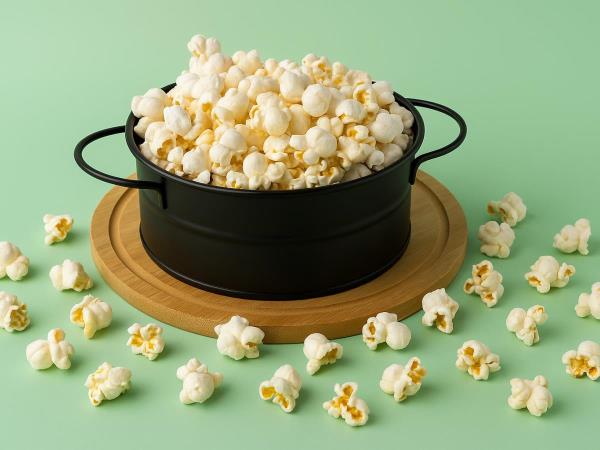Popcorn is by definition whole grains. This means that the grain is not removed or heavily processed, preserving its inner parts (e.g., hull, outer layers), which means they retain more fiber, minerals, antioxidants.
What do popcorn contain: calories, fiber, and antioxidants
Let's start with the numbers:
- If you prepare popcorn with hot air or in an air popper without additives (no oil, no butter, no salt), 3 cups of popcorn (about 24 grams) contain around 100 calories.
- If you take 100 grams of plain popcorn (without additives), they contain about 382 kcal (carbohydrates, proteins, and a small amount of fats).
- Fiber: Popcorn is rich in fiber. In 100g, there are approximately 15g of fiber.
- Antioxidants / phenolic acids (various beneficial substances): Research has shown that samples of commercial popcorn contain an average of 5.93 mg/g of total polyphenols before digestion and 2.66 mg/g after digestion, meaning some of these compounds remain available to the body.
What does it mean after digestion? This is a term used in the lab, outside the body, to simulate how the body would digest substances. Popcorn are not empty calories. They have a good amount of fiber and beneficial plant substances.
Why do some popcorn really cause weight gain?
Looking at the numbers above, you might wonder: why do people say that popcorn make you gain weight? The answer is that many popcorn varieties you buy or order contain a lot of additives: oils, butter, salts, sugars, spices, coatings, flavor enhancers. These additives turn a light snack into a calorie bomb.
When you add oil or butter, the calorie count significantly increases. One tablespoon of oil can increase the calorie content of popcorn by 130 calories per 100 grams. That's quite a lot! However, this number depends on the density of the oil and the amount used.
If popcorn are prepared in a microwave bag with a sugary coating or fat, they often contain saturated fats, trans fats, and lots of salt. These additives are not just calories; they also affect how much water you retain, how you feel (bloated), and how difficult it feels on your body after consumption.
Therefore, the key is not just the popcorn as a raw material but how they are prepared and what is added to them.
Do oil-free popcorn cause weight gain?
If you prepare popcorn without fat (e.g., using hot air or an air popper), without additional butter or sugar, and lightly salt them, or not at all, then they are not fattening on their own. The goal of any weight loss is to create an energy balance. If you consume more calories than you burn, you will gain weight. If you consume less or equal, your weight will not increase.
Studies show that popcorn in its pure state helps to satisfy more than chips:- In one study, participants felt less hungry after eating popcorn compared to chips. They enjoyed 6 cups of popcorn (about 100 kcal) and felt fuller than with chips.
- In this study, participants who ate popcorn consumed the same or even fewer calories in their total daily intake (snacks + meal) as those who only drank water, while those who ate chips consumed more calories.
So, basically, popcorn can be seen as an ally in their preparation.
Where the danger lurks and who needs to be cautious
While popcorn can be healthy, there are groups and situations where caution is needed:- Processed / microwave popcorn
Sometimes, bags contain additives that are not completely controlled. Although some harmful additives (like diacetyl in fat flavors) have been abandoned in many products, it is still wise to check the ingredients and avoid high levels of saturated fats and salt.
- Overeating
If you consume a lot of popcorn with additives, calories can quickly add up. For example, if you add butter or sugar, even a small amount adds several hundred calories.
- Individuals with digestive diseases or diverticulosis
Diverticulosis is a condition where pouches develop in the wall of the large intestine. In the past, people with this condition were advised to avoid popcorn, nuts, and seeds. However, significant progress has been made with research showing no increased risk from eating popcorn. In fact, people who eat popcorn (at least 2 times a week) have no more risk of complications than those who almost never eat them.
- Adding salt, sugar, fats
This is the main switch from healthy to unhealthy. If popcorn are salty from dirt, sweetened, or buttered, they are far from the light version.
Do popcorn help with weight loss?
If properly prepared and placed in the context of a balanced diet, popcorn can be part of a weight loss strategy. Here's how:- The fiber in popcorn helps you feel full for longer, preventing overeating between meals.
- Due to their low caloric density, meaning you get a good amount of grains for a low energy intake, thus making it easier to reduce your total caloric intake.
- If you replace heavy and fatty snacks with plain popcorn, it is definitely a step in the right direction.
But it's important to know: popcorn alone will not magically shrink your weight. Weight loss is the result of a calorie deficit, meaning: you consume less than you expend. Popcorn can help you go through this process more comfortably, with less hunger and more satisfaction.
Homemade and affordable solutions: how to make healthy popcorn
Here's a description of the process:- With hot air (air popper)
Use an air popper or a device that heats the kernels without oil. If you don't have such a device, you can use a container or pot and let the kernels slowly pop.
- In the microwave, completely raw
Put the kernels in a paper bag (without prints, without metallic parts), fold the bag, and microwave for 2 to 3 minutes until the pops slow down. You can adjust the time slightly each time.
- With very little or no fat in the oven
Spread the kernels on a baking sheet, preheat the oven to around 220 to 250 degrees Celsius (which is quite hot), use a fan if your oven has one. Try them without oil at first; if they don't stick, that's great, continue; if they do, add a drop of oil or spray with a sprayer.
Spices instead of salt and butter
For a more intense flavor, add spices: paprika, garlic powder, turmeric, sugar-free spices. Avoid cheese powders, sugar, caramel because that's no longer a light version of popcorn.
Time for consumption and moderation
Set a limit for each snack (e.g., 1 cup as a snack). Before going to bed, give your body at least 2 hours without food to digest (this rule is not written in scientific guidelines but is supported by common practice and the idea that digestion slows down at night).
Do popcorn make you gain weight and how to use them
Popcorn are a good choice as a replacement for unhealthy snacks because they are cheap, accessible, can be adjusted to taste, and contain beneficial substances. With proper preparation, they become a weight-loss-friendly snack rather than a foe. Use them as a snack, not as a meal, replace unhealthy snacks with them, enjoy a family movie night, and treat yourself to something enjoyable but not harmful.
But remember, moderation is key! - In one study, participants felt less hungry after eating popcorn compared to chips. They enjoyed 6 cups of popcorn (about 100 kcal) and felt fuller than with chips.









 Would you like to be informed about news on the website?
Would you like to be informed about news on the website?

